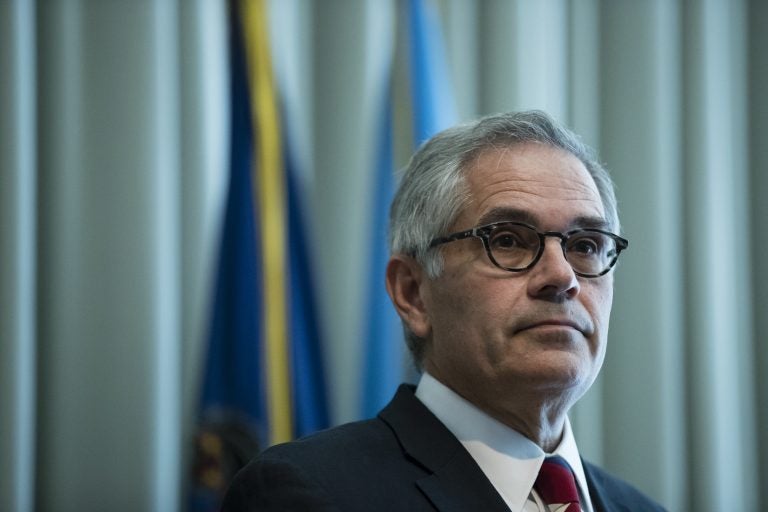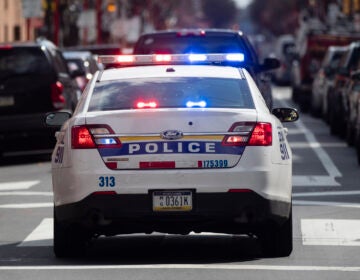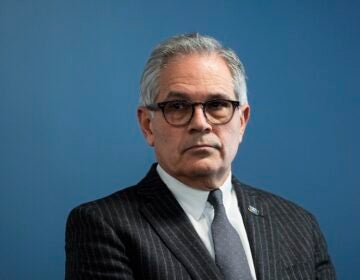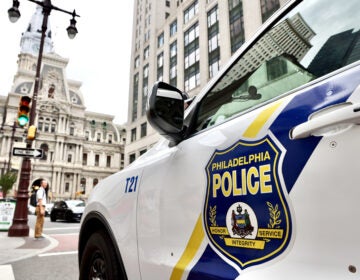Philly DA Krasner says he was left out of policing talks during protests
Morning Edition host Jennifer Lynn talks with Philadelphia DA Larry Krasner about how he wished he were involved in planning police response to protests.
Listen 7:23
In this file photo, Philadelphia District Attorney Larry Krasner speaks with members of the media during a news conference in Philadelphia, Tuesday, Sept. 4, 2018. (Matt Rourke/AP Photo)
Federal officers are pulling out of Portland, Oregon after weeks of violent clashes with anti-racist protesters there.
President Trump suggested he could send federal officers to Philadelphia and other cities with Democratic mayors, but there’s no indication that’s happening.
Thousands of protesters tirelessly marched and rallied against police brutality in Philly in the weeks immediately following the death of George Floyd in Minneapolis. There are still occasional protests here.
Last week the Philadelphia District Attorney’s office announced the arrest of a SWAT officer alleged to have pulled down masks of peaceful protesters in early June on I-676 to directly pepper spray their faces.
District Attorney Larry Krasner recently told Morning Edition host Jennifer Lynn he wished he were involved in conversations with Mayor Kenney, outgoing City Managing Director Brian Abernathy, and new Police Commissioner Danielle Outlaw about how police were directed to behave during civil unrest.
She asked him, “What do you mean you weren’t involved in those talks?”
–
What do I mean? I mean when the managing director’s office and the police commissioner and the mayor were making various plans about what they were going to do on 676 or in West Philadelphia or in other sections of the city, I was not invited. I was not there. And of the whole crew, I am the lawyer. I am the one who’s been doing criminal justice in a courtroom for a long time. I have a very deep experience with civil rights, constitutional rights and protest activity and how it has been prosecuted appropriately and inappropriately. I’ve done lawsuits about this stuff, but when everybody in the room has none of those qualifications, you don’t have a full discussion.
Now, considering that there obviously have been some serious problems with how it was handled, I suppose it could be that I would have been there and had no impact and then people would have had the misimpression that somehow I was OK with that. But I think that everyone recognizes we can do better. We’ve heard apologies from the mayor, from, I believe it was Inspector Dennis Wilson, from the police commissioner. We’ve heard an apology by Brian Abernathy. I don’t think I’m giving away a secret by saying a lot of people in the city think things could have been handled better. I only wish that I had been allowed the role of assisting early.
I think by definition, district attorneys can shape some of the policing priorities for their region in a number of ways. Do you feel like the city doesn’t see you as having that role?
I think a lot of people in the city see me as having that role. I think I’m having a good and increasingly collaborative relationship with the police commissioner. I think I also had a good relationship with the prior police commissioner. But I think there’s more to be done. I’m very hopeful that with the change in the managing director’s office and a few other things going on, this is going to work better in the future.
Your office announced charges against Philadelphia SWAT Officer Richard Nicoletti saying he pulled down protesters masks before pepper-spraying them on the Vine Street Expressway in early June. Is this type of behavior on par with what federal agents are doing to protesters in Portland, Oregon?
I mean, it’s not as bad as fracturing a skull with a “nonlethal” object, which happened in Portland. I don’t know how to compare it exactly to being yanked off the street and thrown into a rental van by unidentified, militarized federal police. They’re bad. I mean, it feels very much like the United States has somehow become an authoritarian regime. And this is not the country we know. Philly has a particular history here. We are the cradle of freedom and that stuff don’t fit. Part of my oath is to seek justice. But another part of my oath is to stand up for the Constitution and the laws of the commonwealth. We cannot have a situation where police officers are paid by taxpayers operating under the authority of the Constitution and they blatantly violate it while committing other crimes. And there’s no accountability. I really don’t think anybody should have a problem with the great care that has gone into our making sure that, so far, a few of these officers were accountable for crimes that they committed. And we will continue to investigate allegations of that nature.
In cases in Philadelphia right now where excessive force on protesters is being looked at, do you think that kind of force is a symptom of too little training of officers who’ve had access to these batches of militarized equipment and basically they’re just not trained to know when to, and when not to, use any of that?
I think it’s a combination of different issues. I can tell you, if you look at what happened in the Twin Cities, nobody should lose track of the fact that the senior officer on the scene was the most murderous and that he was essentially supervising and training some brand new officers. That is a pattern that in some ways, without being more specific, repeated itself in Philadelphia. You’re watching manifestations of an old culture. Frank Rizzo used to call it, I think it was “scappo il capo,” meaning break the head. You have an old culture that resorted to brutality, that was comfortable with racism, that was all about dominance, that had no tolerance for things like protests in the streets. That is in some cases personified by some of the supervisors. And they’re trying to make sure that culture goes on by showing what it means to be a hard man or a hard person, put it that way. Other cities, some of them at least, have moved forward a bit. But for a whole lot of reasons, including the now waning political power of the Fraternal Order of Police, we have had a city that, to a large extent, has loved having unaccountable policing, and that just has to change.
Just briefly, talk about accountability under Commissioner Danielle Outlaw. 676 happened. These are in the early days of her being commissioner. Should we have enormous confidence in her? She’s accountable for that, right?
I’m optimistic about our commissioner. I’ve dealt with her quite a bit. I know that not every day is going to be a perfect day for her, just like not every day is a perfect day for me. But, you know, I can give you an example. When Charles Ramsey came to Philadelphia, he had been stung with I think it was about a $10 million lawsuit in Washington, D.C. for his handling of protesters. And nevertheless, he ended up being much better at dealing with protesters in Philly than he had been elsewhere. Danielle Outlaw has her own record of being criticized in Portland for dealing with protesters. I think this commissioner is a reform commissioner, as in many ways, Ramsey was. I think that she truly intends to make things better. It’s kind of hard when you’re running 6,300 active officers within the police department. Plus you got all kinds of “help” coming from outside. It’s kind of hard to make sure that everything goes the right direction and everybody tells you the right thing and that you never make a mistake. I am an optimist about this commissioner. I think the more control she is given over the police department, the better we’re going to do.
Well, thank you for your time. I really appreciate that.
Sure.

Get daily updates from WHYY News!
WHYY is your source for fact-based, in-depth journalism and information. As a nonprofit organization, we rely on financial support from readers like you. Please give today.





